
The Central Tibetan Administration is a non-profit political organization based in Dharamshala, India. Its organization is modeled after an elective government, composed of a judiciary branch, a legislative branch, and an executive branch, and is sometimes labelled as a government in exile for Tibet.

Dharamshala is a town in the Indian state of Himachal Pradesh. It serves as the winter capital of the state and the administrative headquarters of the Kangra district since 1855. The town also hosts the Tibetan Government-in-exile. Dharamshala was a municipal council until 2015, when it was upgraded to a municipal corporation.
Miss Tibet is an annual beauty pageant held in McLeod Ganj, India. It is produced by Lobsang Wangyal Productions.
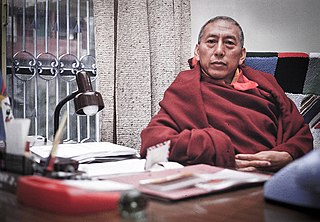
Lobsang Tenzin, better known by the titles Professor Venerable Samdhong Rinpoche and to Tibetans as the 5th Samdhong Rinpoche, is a Tibetan Buddhist monk and politician who served as the Prime Minister of the cabinet of the Central Tibetan Administration, the Tibetan government-in-exile based in Dharamshala, India.
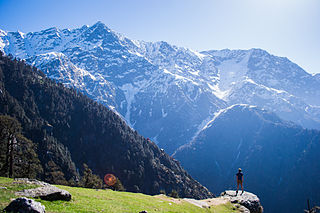
McLeod Ganj or McLeodganj is a suburb of Dharamshala in Kangra district, Himachal Pradesh, India. It is known as "Little Lhasa" or "Dhasa" as the Tibetan government-in-exile is headquartered here and there is a significant population of Tibetans in the region.
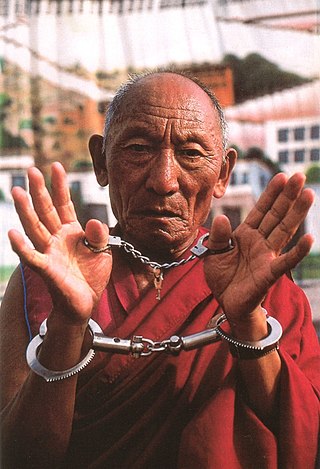
Palden Gyatso was a Tibetan Buddhist monk. Arrested for protesting during the Chinese invasion of Tibet, he spent 33 years in Chinese prisons and labor camps, where he was extensively tortured, and served the longest term of any Tibetan political prisoner. After his release in 1992 he fled to Dharamsala in North India, in exile. He was still a practicing monk and became a political activist, traveling the world publicizing the cause of Tibet up until his death in 2018. His autobiography Fire Under the Snow is also known as The Autobiography of a Tibetan Monk. He was the subject of the 2008 documentary film Fire Under the Snow.

The 14th Dalai Lama is, as the incumbent Dalai Lama, the highest spiritual leader and head of Tibetan Buddhism. By the adherents of Tibetan Buddhism, he is considered a living Bodhisattva; specifically, an emanation of Avalokiteśvara in Sanskrit, and Chenrezig in Tibetan. He is also the leader and a monk of the Gelug school, the newest school of Tibetan Buddhism, formally headed by the Ganden Tripa. The central government of Tibet at the time of his selection, the Ganden Phodrang, invested the Dalai Lama with temporal duties until his exile in 1959.
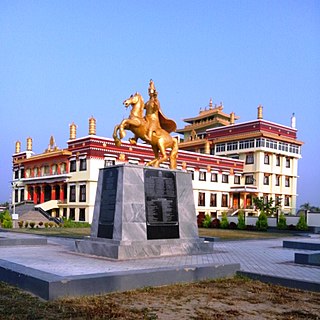
The Tibetan diaspora are the diaspora of Tibetan people living outside Tibet.

Lobsang Wangyal is a writer, social activist, photojournalist, and events producer, based in McLeod Ganj, Dharamshala, India. He has been a stringer reporter and photographer for Agence France-Presse for many years.
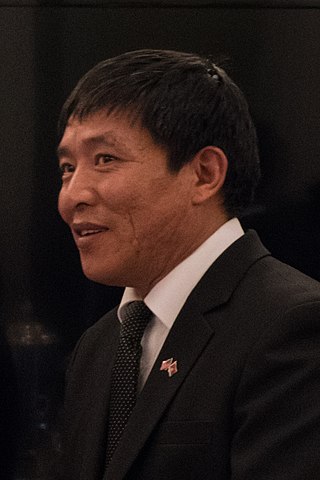
Dhondup Wangchen is a Tibetan filmmaker imprisoned by the Chinese government in 2008 on charges related to his documentary Leaving Fear Behind. Made with senior Tibetan monk Jigme Gyatso, the documentary consists of interviews with ordinary Tibetan people discussing the 14th Dalai Lama, the Chinese government, the 2008 Beijing Olympics, and Han Chinese migrants to the region. After smuggling the tapes of the interviews out of Tibet, however, Dhondup Wangchen and Jigme Gyatso were detained during the 2008 Tibetan unrest.

The 2012 BRICS summit was the fourth annual BRICS summit, an international relations conference attended by the heads of state or heads of government of the five member states Brazil, Russia, India, China and South Africa. The summit was held at Taj Hotel in New Delhi, India on 29 March 2012 and began at 10:00 Indian Standard Time. This is the first time that India has hosted a BRICS summit. The theme of the summit was "BRICS Partnership for Global Stability, Security and Prosperity".

Tenzing Sonam is a Tibetan film director, writer and essayist based in Dharamshala. He works through his production company, White Crane Films, which he runs with his partner, Ritu Sarin.

Majnu-ka-tilla (MT) is a colony in Delhi, India that was established around 1950. Majnu-ka-tilla is officially called New Aruna Nagar Colony, Chungtown, and Samyeling. It is part of North Delhi district and is located at the bank of the Yamuna River (NH-1) near ISBT Kashmiri Gate.

Bringing Tibet Home is a 2013 documentary film produced and directed by Tibetan filmmaker Tenzin Tsetan Choklay about Tibetan contemporary Artist Tenzing Rigdol's art piece "Our Land Our people". The film premiered at the 2013 Busan International Film Festival in South Korea. This is a Tibetan-language film.
Tenzin Mariko is a Tibetan model and LGBTQ icon. She is the first openly transgender Tibetan in the public eye.

Tibet–India relations are said to have begun during the spread of Buddhism to Tibet from India during the 6th century AD. In 1959, the Dalai Lama fled to India after the failed 1959 Tibetan uprising. Since then, Tibetans-in-exile have been given asylum in India, with the Indian government accommodating them into 45 residential settlements across 10 states in the country, creating the Tibetan diaspora. From around 150,000 Tibetan refugees in 2011, the number fell to 85,000 in 2018, according to government data. Many Tibetans are now leaving India to go back to Tibet and other countries such as United States or Germany. The Government of India, soon after India's independence in 1947, treated Tibet as a de facto independent country. However, more recently India's policy on Tibet has been mindful of Chinese sensibilities, and has recognized Tibet as a part of China.
Tibetan Review is a Tibetan monthly journal and news website published in English, based in Delhi, India. It was first published in Darjeeling, West Bengal in April 1967 by Lodi Gyari. It is well known for its open and vibrant democratic forum for the discussion of the Tibetan problem and other related governmental and social issues on Tibet.
The Tibet Policy Institute (TPI), founded in 2012, is a Tibetan think tank and research-oriented intellectual institute of the Central Tibetan Administration. TPI is based in Dharamshala, Himachal Pradesh, India.

Penpa Tsering is a Tibetan politician based in India. He is the second democratically elected Sikyong of the Central Tibetan Administration in India. He succeeded the last Sikyong Lobsang Sangay on 27 May 2021. Penpa Tsering was the speaker of the Parliament of the Central Tibetan Administration for two terms between 2008 and 2016.

Thubten Samphel was a Tibetan writer, journalist, and government official. He worked as a secretary in the Ministry of Foreign Affairs and was a spokesperson of the Central Tibetan Administration, based in Dharamshala. He also worked for the administration's think tank, Tibet Policy Institute.



















